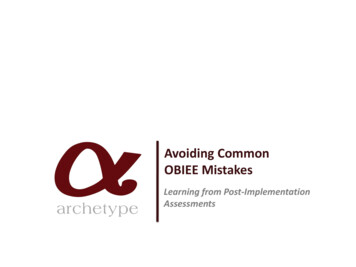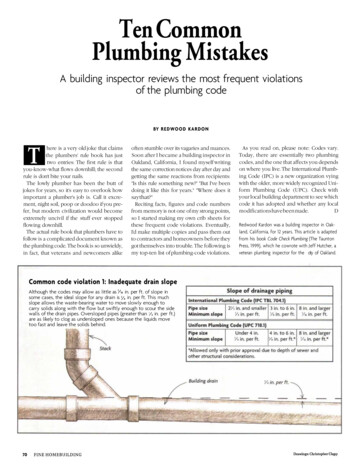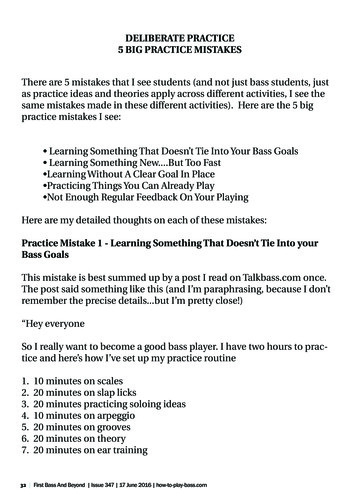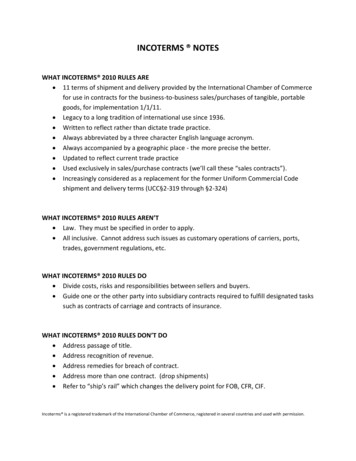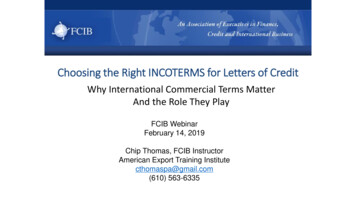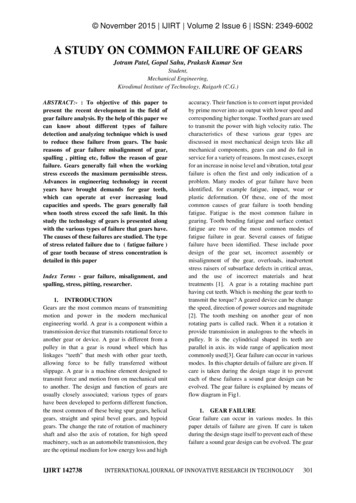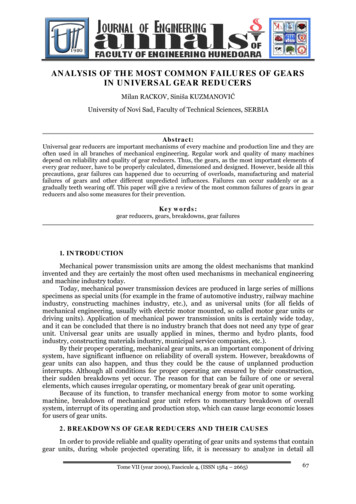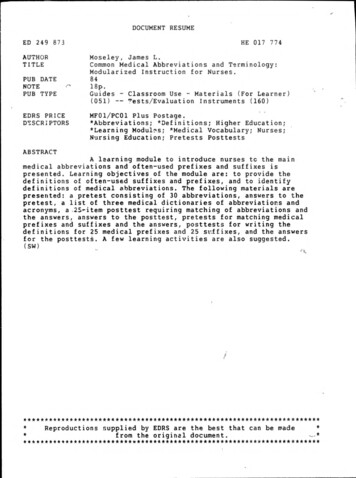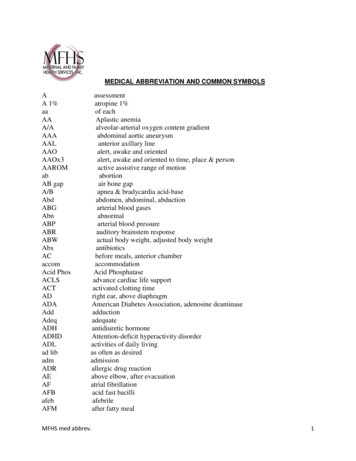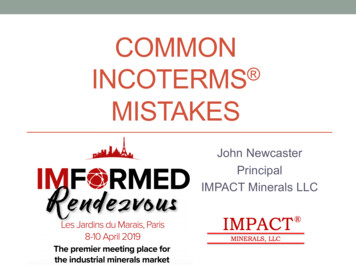
Transcription
COMMON INCOTERMSMISTAKESJohn NewcasterPrincipalIMPACT Minerals LLC
This is not an Incoterms CourseThe purpose of today to raise awareness (and ouslIIII
Basics of Incoterms Incoterms 2010 is written and published by theInternational Chamber of Commerce (ICC) The ICC has been writing and publishing these rules forover 80 years. They clearly define in 11 three-letter rules: Seller and buyer responsibility for arranging transport & insurance Seller and buyer responsibility for cost of transport & insurance Seller and buyer responsibility for export and import clearance The point of delivery of goods & risk passing to a buyer Incoterms 2010 is available at Amazon or the ICCbookstore www.iccbooks.com www.store.iccwbo.org.icc-incoterms
Incoterms 2010 Sea and inland waterways (“marine”) FAS - FREE ALONGSIDE SHIP FOB - FREE ON BOARD CFR - COST AND FREIGHT CIF – COST INSURANCE AND FREIGHT Any mode(s) of transport (“omni”) EXW - EX WORKS FCA - FREE CARRIER CPT - CARRIAGE PAID TO CIP - CARRIAGE AND INSURANCE PAID TO DAT - DELIVERED AT TERMINAL DAP - DELIVERED AT PLACE DDP - DELIVERED DUTY PAID
Incoterms 2010 SummaryRules for any mode or modes of transportEXWEx WorksFCADATDAPRules for sea and inland waterway transportCPTCIPDDPFreeCarrierCarriage PaidToCarriage&InsurancePaid ToDelivered atTerminalDelivered atPlaceDelivered DutyPaidFASFreeAlongside ShipFOBCFRFreeonBoardCost&FreightCIFCost,Insurance &FreightSERVICESWho PaysWho PaysWho PaysWho PaysWho PaysWho PaysWho PaysWho PaysWho PaysWho PaysWho PaysExport ellerSellerSellerSellerMarking & SellerSellerSellerSellerBlock and Brace11111111111Export Clearance ellerBuyerBuyerSellerSellerInland Freight to Main ellerSellerSellerOrigin Terminal erSellerSellerSellerVessel Loading erSellerSellerSellerOcean Freight / Air erBuyerSellerSellerNominate Export uyerBuyerSellerSeller333Seller333333SellerUnload Main Carrier estination Terminal te SecurityInformationRequirementsCustoms Broker llerBuyerBuyerBuyerBuyerDuty, Customs Fees, rBuyerBuyerDelivery to Buyer rDelivering Carrier uyerBuyerBuyerMarine Insurance
Incoterms 2010 Risk and Cost
Main Benefit of Incoterms Reduce risk especially when trade is betweencountries* A clearly-written contract reduces misunderstandings Countries have different business cultures and languages Incoterms support by specifying the exporting seller and importing buyer’s obligationsIncoterms eliminate confusion with regards to rules oftransportation from point A to point BEach Incoterm has very detailed and unique standards ofobligations making each term a powerful leverAll details of a rule become a contract obligation soUnless the contract language supersedes one or more of thedetailed obligations, the buyer and seller are legally obligatedto them* Incoterms 2010 is the first edition to include domestic trade
Common Mistakes This covers a partial list of some very common mistakesand misunderstandings with: FOB DDP EXW Named Place Water vs. Omni Terms Obsolete Terms Variants Insurance Title/ownership Revenue recognition LOCs
Misapplying FOB Common mistakes Using FOB when there is no water component, e.g., Loading on a truck: No vessel to deliver goods “on board” Loading not at a port: Meant as a water term Example - FOB San Antonio, if not loaded on a Riverwalk tour boat! Container shipment: FCA and FAS better handle risk transfer Risk examples if cargo arrives damaged in a container, who can tell if the damageoccurred before the cargo was placed on board or after? if a fire consumes the staging warehouse at load port, with FOBrisk is still with the seller vs. with FCA risk passed to buyer already Bad examples: “FOB Elko Nevada”, “FOB Plant”
Applying DDP when a seller is limited inability to execute DDP Delivered Duty Paid Seller may not have a legal entity or importer’s customs bond in the country or port of deliverySeller may not understand the liabilities, costs, or other risksinvolved in clearing customs in a foreign countySeller may not have correctly built terminal handling charges intopricingHas VAT been understood and considered by Seller?At the extreme, goods can be held up in customs, delayingbuyers access and holding up payment, not to mention risksof trade compliance violations
Using EXW for simplicity sakeDelivery occurs when seller places goods at Buyers’disposal at the named place Buyer risks Is Buyer able to collect and load? Is Buyer able to transport? Is Buyer able to arrange export clearance? Is Buyer able to arrange export transportation? Seller risks: A Letter of Credit sale with an on-board bill of lading as one of therequired matching documents Seller has delivered yet has lost control of the paymentconditions and trade compliance
Inattention to Named Place No named place, or named places that are vague or ineligible Risks misunderstanding between seller and buyer Risks confusing freight providers Very important to be precise with place AND point Examples: DDP Jakarta: Buyer thinks its sellers duty to deliver to final destination warehouse dock Seller only has to get it through customs house Buyer may have unanticipated dray costs, possible port storagecharges or container demurrage Even worse if DAP especially with a vague named place DAT with no exact terminal (point)* Reminder: Delivery point and place are where risk passes, notalways buyer’s final destinations
Misapplying a water rule Using a sea and inland waterway rule for containerizedcargo Under CIF (a water term) - risk in the goods passes from the seller to the buyer at the time the goods are loaded and stowed on boardthe vesselUnder CIP (an “any mode” term) - risk in the cargo passes whenthe goods go into the care of the main carrier (often warehouse orquayside)Example: When a tsunami in 2011 damaged a Japanesecontainer terminal, many containers were damagedAny CIF shipment would not have had its risk passing to the buyeruntil containers were loaded on board, hence risk would be withsellerAlso obligation to replace
Using an obsolete Incoterm Incoterms 2010 replaced Incoterms 2000 Examples of obsolete terms still in contracts DAF – delivered at frontier, replaced by DAP DDU – delivered duty unpaid, replaced by DAP DES – delivered ex-ship, replaced by DAP DEQ – delivered ex-quay, replaced by DAT Using such terms without specifying Incoterms 2000 notgood in disputes and not using current terms misses chanceto be precise
Using a non-ICC variant Examples FOBST (Free on Board Stowed and Trimmed) Redundant to “on board” Open to interpretation of “stowed and trimmed” FOB implies cargo placed on board EXWL (Ex-Works, Loaded) – loaded where? The first carriage or a vessel? Extends Seller’s obligation to an imprecise point outside his control CIFFO (CIF Free Out) Conflates an Incoterm with a liner term for freight rate quotation Free Out acknowledges who is paying for unloading but does notchange risk passage under CIF, BUT both parties may not interpretCIFFO that way Variant Incoterms are attempts to add precision, but almostalways add uncertainty and unintended risk
Using C-rules without adequate thought tolevel of insurance CIP (any) & CIF (sea & waterway) Sellers are required to buy minimum coverage insurance Anything additional is at buyers expense CPT (any) and CFR (sea & waterway) Sellers are not require to pay for insurance Often used interchangeably Has the Buyer insured the goods in transit?* Reminder: Two I-rules are the only rules that require any levelof insurance
Assuming passage of title based on theIncoterm Incoterms do not provide either party with a contract ofsale Incoterms do not cover ownership or title transfer ofthe goods These terms are agreed upon separately between the twotransacting parties Title should pass once the contract has been satisfied by the sellerdelivering, risk of loss transferring, and buyer paying A good contract with Incoterms properly aligned withthe mutually understood tasks, costs, risks, and passageof title, are critical
Using solely for Revenue Recognition Incoterms alone don’t dictate when seller can recognizerevenue: Is there a PO or contract, a price set, and expectation of collection,and has delivery occurred? Delivery usually results when goods are loaded, handedover to first carriage, and/or a BOL delivered This is a connection with Incoterms But How often do sellers recognize revenue and relieve inventorybefore the goods have been delivered (to the named place)? How often do buyers fail to recognize inventory as soon as thegoods have been delivered? Risks – GAAP and SEC trouble
Misalignment of Incoterms with letter ofcredit (LOC) or provisions LOC and control With the Incoterms rules FCA, FOB and FAS, the buyer isresponsible for the main carriage, Buyer is in a position to interfere with the issue of the transportdocument that is called for by the letter of credit preventing theseller from presenting LOC-compliant documents and gettingpaid Best practice Select the Incoterm that best aligns In cases of LOC consider a C-rule, the Seller Arranges freight Controls documents Does not have risk of transit beyond named place and point
SummaryProperly used, Incoterms are an extremely convenientand powerful tool for reducing misunderstanding betweeninternational sellers and buyers with respect to theirobligations If misapplied they can cause the opposite and creategreater risk, confusion, and loss Apply with Care Correctness Precision Alignment
About the Author Supply Chain VP, Major OFS Companies 2000-2011 M-I SWACO, Baker Hughes Drilling Fluids, Tesco CorporationGlobal Logistics VP, Baker Hughes 2011-2016 Founder The Cumberland Group, Inc. 1988 IMPACT Minerals LLC 2016Exclusive Sales Agent for a major minerals equipmentmaker and two mining/processing companies Exclusive Oil & Gas Advisor for The Barytes Association Consultant to several OFS companies
Disclaimers This presentation is neither legal advice, tax advice,accounting advice, nor trainingIt is by nature incomplete and high level for the sake ofbrevityIt is intended to raise awareness, hence greater care andprecision in future trade transactionsThe author advises the audience to seek qualified counselwhen contracting with suppliers and customers, andencourages investment in training on the topicNo attorney-client relationship is intended or impliedherein
Or for in depth, professionaland customized training, andconsulting on the subject, Ihighly recommendProven LogisticsSolutions LLC3663 N. Sam Houston Parkway E.Suite 600Houston, TX 77032Tele: ogisticssolutions.com 1 713-409-0904jnewcaster@im-pact-min.com
Incoterms 2020 What we will likely see? Too early to know, but several improvements, simplifications, andextensions are being considered When will it go into effect? We are hearing as early as Q4 2019 or as late as Q4 2020
Using solely for Revenue Recognition Incoterms alonedon’t dictate when seller can recognize revenue: Is there a PO or contract, a price set, and expectation of collection, andhas delivery occurred? Delivery usually results when goods are loaded, handed over to first carria
